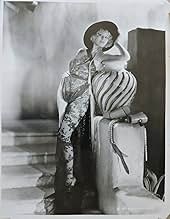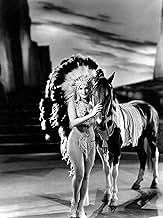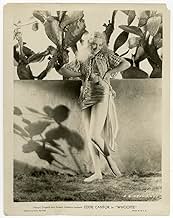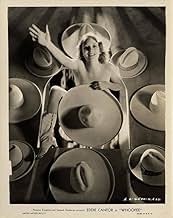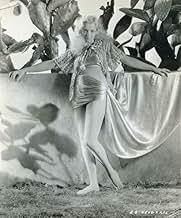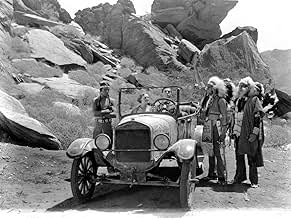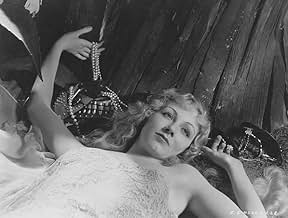अपनी भाषा में प्लॉट जोड़ेंWestern sheriff Bob Wells is preparing to marry Sally Morgan; she loves part-Indian Wanenis, whose race is an obstacle. Sally flees the wedding with hypochondriac Henry Williams, who thinks ... सभी पढ़ेंWestern sheriff Bob Wells is preparing to marry Sally Morgan; she loves part-Indian Wanenis, whose race is an obstacle. Sally flees the wedding with hypochondriac Henry Williams, who thinks he's just giving her a ride; but she left a note saying they've eloped! Chasing them are j... सभी पढ़ेंWestern sheriff Bob Wells is preparing to marry Sally Morgan; she loves part-Indian Wanenis, whose race is an obstacle. Sally flees the wedding with hypochondriac Henry Williams, who thinks he's just giving her a ride; but she left a note saying they've eloped! Chasing them are jilted Bob, Henry's nurse Mary (who's been trying to seduce him) and others.
- 1 ऑस्कर के लिए नामांकित
- 2 जीत और कुल 1 नामांकन
- Sheriff Bob Wells
- (as John Rutherford)
- Cowhand
- (बिना क्रेडिट के)
- Goldwyn Girl
- (बिना क्रेडिट के)
- Cowhand
- (बिना क्रेडिट के)
- Goldwyn Girl
- (बिना क्रेडिट के)
- Ed - Cowhand
- (बिना क्रेडिट के)
- Goldwyn Girl
- (बिना क्रेडिट के)
- Goldwyn Girl
- (बिना क्रेडिट के)
- Girl
- (बिना क्रेडिट के)
फ़ीचर्ड समीक्षाएं
Surreal plot if full of schtick and is VERY non-PC (another reason to love it) as Blacks, Indians, Jews, Gays, and Goys get lampooned by Cantor and company.
Several terrific songs by Cantor, "Making Whoopee" and "My Baby Just Cares for Me," and a couple of excellent production numbers by Busby Berkley. Ethel Shutta (pronounced shoo-tay) was smashing in her "Stetson" number. I wish it had been longer.
Among the show girls and dancers are Betty Grable, Ann Sothern, Virginia Bruce, Claire Dodd, and possibly Jane Wyman, and Dean Jagger (of all people) plays a deputy.
The typical 20s romantic subplot between white Eleanor Hunt and Indian Paul Gregory is a drag and is the same things we've seen in the early Marx Brothers and Wheeler and Woolsey comedies.
Spencer Charters plays Underwood, Marian Marsh is his daughter, Jack Rutherford is the sheriff, etc.
The colors are great, the costumes fun. Flo Ziegfeld was involved show there are plenty of show girls in outrageous costumes.
Shutta is a find, but it's Eddie Cantor's show all the way and he's very very funny.
There are lots of gags, and like the Marx Brothers films, so many that you can't catch them all. Also like the MB, some of the humor is topical, so audiences of today aren't going to get what people would laugh at in 1930.
Through all the jokes - many stupid and many clever - Cantor is a likable guy and also a good singer. As I wrote with another review (Roman Scandals) I am just sorry this talented man doesn't have his films out on DVD. The songs in here are decent, too, some of them very catchy. They also have the added attraction of having the Busby Berkeley joining in.
Make no mistake: this is a "sappy" film, so dated it's extremely stupid in spots....but definitely something for the film collector.
The tale that acts as a vehicle for all of Eddie Cantor's antics is a simple one, and one that is repeated in several films over the years - that of forbidden love between races. Sally, a white girl, falls in love with Wanenis, an Indian. Since such marriages were forbidden, Wanenis goes away into the wilderness to deal with the fact they cannot be together. In the meantime, Sally's father arranges for her to marry Sheriff Bob Wells. Wanenis returns on Sally's wedding day, not knowing it is her wedding day. When Sally sees Wanenis, she knows she cannot go through with the sham wedding and runs away. The fun comes in with how she runs away. She tells sickly Henry Williams (Eddie Cantor) that she and Bob are planning to elope, and that she needs him to drive her into the next town. However, she leaves a note for everyone else saying she has eloped with Henry. Not only is the vengeful sheriff, his men, and Sally's father soon hot on their trail, but Henry's aggressively love-sick nurse is after them too. Only Wanenis finds this whole thing an odd turn of events and takes a short cut to go looking for them, separate from the rest of the pack. Complications and opportunities for Cantor's always enjoyable remarks, eye movements, and musical interludes ensue.
This film survives intact in splendid shape, and the Technicolor truly yields a spectacular painted desert. Although best remembered songs from this film will always be title song "Makin' Whoopee" and "My Baby Just Cares For Me", both performed by Eddie Cantor, I also really liked the love ballad sung by the star-crossed lovers Sally and Wanenis -"I'll Still Belong to You". It has an operatic quality that is typical of love songs from that era, and oddly enough was written by Nacio Herb Brown of MGM songwriting fame.
Finally, let me mention the fact that some of the racial aspects of this film might leave the modern viewer squeamish such as the stereotypes of native peoples and the fact that Eddie Cantor usually appeared in black-face as part of his act and does here too. Try to remember that none of this is out of character for a film made 80 years ago and no mean-spiritedness was intended at the time.
Highly recommended for a chance to see Eddie Cantor in one of his best.
Before Eddie Cantor starred in the musical version of Whoopee on Broadway which ran for 407 performances in the 1928-29 season, it had been a straight comedy play The Nervous Wreck which ran for 279 shows in the 1923-24 season. I have to confess I was a little shocked when I saw that Otto Kruger had played Cantor's role of Henry Williams, the nervous hypochondriac who went west seeking a cure for his multitude of ailments. I sure didn't see that coming.
In any event Whoopee has Cantor at a dude ranch with his private nurse Ethel Shutta who was also repeating her role from Broadway. His good friend an Indian played by Paul Williams has an unrequited love for Eleanor Hunt and she him. But the racial differences make this romance impossible at least on the stage and screen of the Twenties. She's engaged to marry the sheriff John Rutherford, but rather than do that she tricks poor Cantor the schnook into running off with her. That leads all on a merry chase throughout the film.
Walter Donaldson and Gus Kahn wrote the score for Whoopee on stage and screen and of course Eddie Cantor's big number was his classic Making Whoopee. Even today this salute to the phrase 'cheaper to keep her' carries a lot of laughs. Donaldson and Kahn wrote some new songs including another that Cantor introduced on screen that also became associated with him throughout his career, My Baby Just Cares For Me.
Ethel Shutta was quite a performer herself and this is the only time we can see her in her prime as she competes with Cantor for laughs and does some nice dancing in the Stetson number. She was married to orchestra leader George Olsen who led the pit orchestra on Broadway for Whoopee and accompanies on the soundtrack in this film.
This film also introduced Busby Berkeley to the silver screen and according to Herbert Goldman's biography of Cantor, it was Cantor who persuaded Sam Goldwyn to hire Berkeley. His numbers are nicely staged though he wasn't anywhere near his peak creative years with Warner Brothers.
On Broadway Ruth Etting had a specialty part and introduced what became her theme song in Love Or Leave Me. Sadly Ruth and the song got eliminated from the film and that is a pity. If you remember the part that Patrice Wymore played in the Gus Kahn biographical film I'll See You In My Dreams her role was based on a combination of Etting and Clara Bow.
Sadly Whoopee does bow to the racial and racist mores of its time. A solution to the marital problems is found that would not fly today.
Despite that Whoopee is worth seeing in order to see one the great performers of the 20th Century in a role that Eddie Cantor made his own.
क्या आपको पता है
- ट्रिवियाBased on a Broadway show produced by Florenz Ziegfeld Jr.. "Whoopee" opened at the New Amsterdam Theatre in New York on Monday, December 4th, 1928 and ran for 407 performances. Unfortunately, Ziegfeld lost everything in the stock market crash of 1929. At the time, "Whoopee" was still playing to full houses on Broadway. To bail himself out, Ziegfeld closed the show on Saturday, November 23rd, 1929 and sold the movie rights to Samuel Goldwyn. It is believed that the Broadway show could have run for another year.
- भाव
Mary Custer: Oh, poor Henry. Let me hold your hand.
Henry Williams: It's not heavy. I can manage. Hold your own hand.
- कनेक्शनFeatured in Precious Images (1986)
- साउंडट्रैकCowboys
(1930) (uncredited)
Music by Walter Donaldson
Lyrics Gus Kahn
Performed by Betty Grable and chorus
टॉप पसंद
- How long is Whoopee!?Alexa द्वारा संचालित
विवरण
- चलने की अवधि1 घंटा 33 मिनट
इस पेज में योगदान दें


